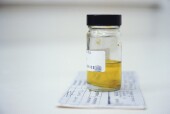- 7 Best Breads for Maintaining Stable Blood Sugar
- Gelatin vs. Collagen: Which is Best for Skin, Nails, and Joints?
- The Long-Term Effects of Daily Turmeric Supplements on Liver Health
- Could Your Grocery Store Meat Be Causing Recurring UTIs?
- Are You Making This Expensive Thermostat Error This Winter?
- Recognizing the Signs of Hypothyroidism
- 10 Strategies to Overcome Insomnia
- Could Artificial Sweeteners Be Aging the Brain Faster?
- Techniques for Soothing Your Nervous System
- Does the Water in Your House Smell Funny? Here’s Why
Urine Test Might Find Pancreatic Cancer Early, Study Suggests


Scientists report that they have developed a urine test that may detect pancreatic cancer at an early stage.
Usually, symptoms of this deadly disease do not appear until it is at an advanced stage and has spread, and little can be done to save the patient. Researchers have been looking for a way to screen people for pancreatic cancer in the hopes that early detection might lead to effective treatment.
“If this test proves to be as good as we hope, we could make an important difference and enable early diagnosis of pancreatic cancer completely noninvasively, using urine samples,” said lead researcher Dr. Tatjana Crnogorac-Jurcevic, a reader in cancer genomics at the Centre for Molecular Oncology at Barts Cancer Institute of Queen Mary University of London.
The team found three indicators (“markers”) that, when combined, signal the beginnings of pancreatic cancer.
“This is important since if this cancer is detected early, patients can undergo surgery, which greatly increases the survival,” she said. “At present, patients are diagnosed with cancer that has already spread and survival is typically three to six months.”
The report was published Aug. 3 in the journal Clinical Cancer Research.
For the study, funded by the Pancreatic Cancer Research Fund, a British charity, researchers analyzed 488 urine samples, including 192 from patients with pancreatic cancer, 92 from patients with chronic pancreatitis and 87 from healthy people. In addition, they looked at 117 urine samples from patients with diseases of the liver and gall bladder. These samples were used to confirm their findings.
Of the 1,500 proteins found in the urine samples, Crnogorac-Jurcevic’s team focused on three: LYVE1, REG1A and TFF1.
The researchers found that patients with pancreatic cancer had elevated levels of all three proteins compared with healthy patients and patients with pancreatitis. Using all three proteins, they were able to detect early stage pancreatic cancer more than 90 percent of the time, they reported.
Although the cause of pancreatic cancer isn’t known, those at risk include people with a family history of the disease, heavy smokers, people who are obese and those over 50 with newly diagnosed diabetes, the researchers said.
The team is hoping to do further tests on urine samples from people at high risk to further validate their findings.
Dr. Leonard Lichtenfeld, deputy chief medical officer at the American Cancer Society, said the findings are very preliminary and more research is needed to see if a screening test could be developed based on these three markers.
Among Lichtenfeld’s concerns for any screening test are accuracy, ease and repeatability to find cancer early. “Ultimately, one has to demonstrate that the test really makes a difference in outcomes,” he said.
“I think it’s premature to make a claim that this is an effective screening test,” he said. “This is not something that is going to be available in the near future.”
More information
Visit the American Cancer Society for more on pancreatic cancer.
Source: HealthDay
Copyright © 2026 HealthDay. All rights reserved.










